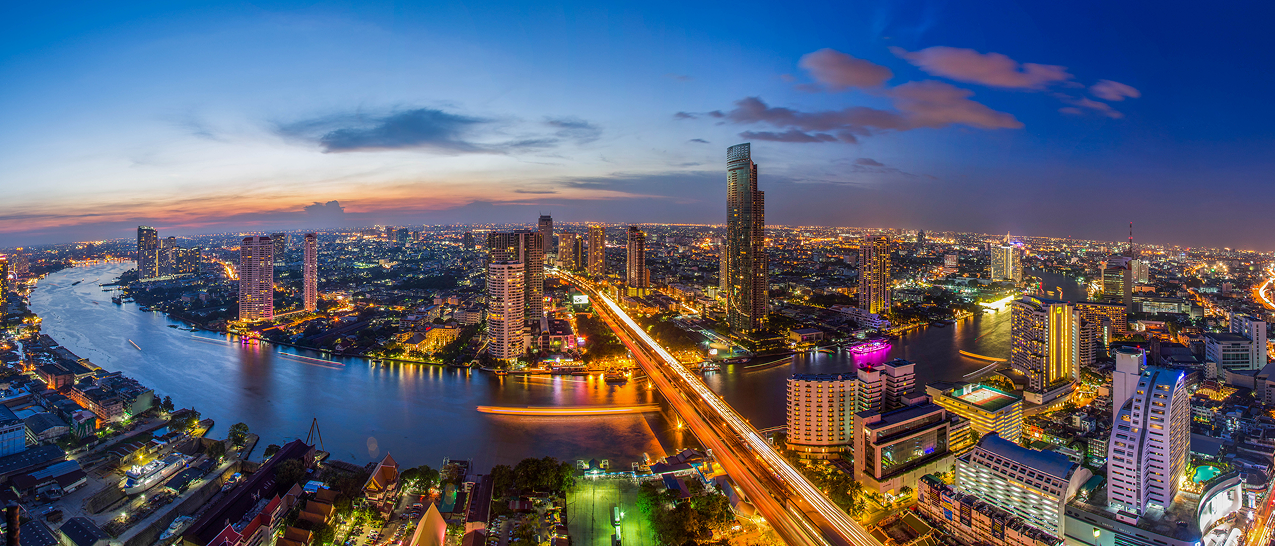

Thailand's Vision for a Green Future
Why Growth and Sustainability Must Go Hand-in-Hand
With a population of about
70 million
and a labour force of
33 million
Thailand has been recognised widely as Southeast Asia’s development success story throughout the years, despite having a per capita GDP of around $7,000.
The country is the second-largest economy in Southeast Asia, trailing behind Indonesia, and is the 21st-largest economy globally.

12th
largest country producing agricultural output

18th
largest country for manufacturing

25th
largest exporter worldwide
Ranked as the 12th largest country producing agricultural output, 18th for manufacturing and 25th largest exporter worldwide, Thailand’s GDP is expected to grow by 3.7% in 2023 – more than a 2% increase since 2021 despite the pandemic’s impact, according to the International Monetary Fund. Despite its success and growth, Thailand continues to face a variety of issues within the country, hindering its full growth potential for its economy.
It is expected that the number of Thais aged 60 and above will rise from
13% in 2010 - 33% by 2040
Bringing about potential issues such as

Incoming strain on healthcare systems, the workforce and economic growth for the country.

The country’s increased dependence on modern industrial systems, such as air conditioning and fuel, have resulted in the rise of temperatures, leading to eventual environmental issues.
As energy consumption increases, climate change issues have become more prevalent in Thailand as well. The country is highly vulnerable to the impact of climate change and is ranked the ninth country in the “extreme risk” category that is most vulnerable to future climate change impacts over the next 30 years. Despite the country’s greenhouse gas (GHG) emissions accounting for less than 1% of global emissions, air quality and pollution have become a severe concern.
Top three emitters of CO2 contributing to 0.8 % of the country’s emission growth annually between 2011 and 2023
 Power Generation
Power Generation
 Industry
Industry
 Transportation
Transportation
Among its larger issues, improper disposal of waste has been another cause of concern, especially for cities like Bangkok, where other factors have screamed the need for urgent climate action.
Another set of challenges faced by Thailand is the adoption of Industry 4.0 and digitalisation. The country lacks significant investment in areas such as research and development, and the adoption of new technologies and infrastructure. This is attributed to both the lack of domestic and international collaboration as well as sources of funding to finance this transition. With the lack of investment, Thailand struggles to address existing skills gaps and re-educate its pool of employees to ensure they do not lack behind their foreign counterparts in terms of upcoming technological advancements.
Inadequate regulations and policies are being established to encourage innovation, experimentation, and accommodation of new technologies as the country continues to also face an increase in cyber risks and data breaches. It is crucial for government bodies, industry players and academia to come together and adopt openness in sharing data and knowledge to drive collaboration, innovation, and growth to realise Thailand’s Industry 4.0 ambitions.

Aside from their current works, Hitachi is also investing in research and development, collaborating with other companies and organizations, and seeking to create innovative solutions to complex problems. The company is also committed to diversity and inclusion, recognizing that a diverse workforce is essential to driving innovation and achieving its goals.
Hitachi's vision and goals reflect its commitment to innovation, sustainability, and social responsibility. With a focus on technology and digital transformation, Hitachi continues to address global challenges such as climate change through projects like the Bangkok Redline – in hopes of a more sustainable and prosperous future.
Date of Release: May 2023













